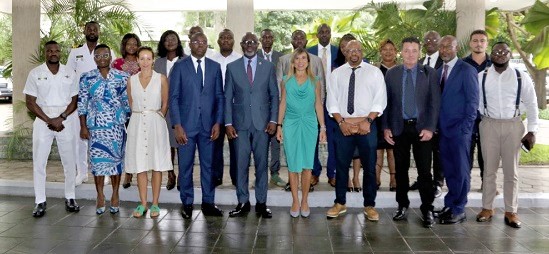
Equip law enforcers to deal with drug trafficking - Narcotics Commission
There is the need for law enforcement officers to be equipped with the requisite skills and knowledge in maritime intelligence systems, trafficking methods and concealments to enable them to deal with drug trafficking in West Africa, the Director-General of the Narcotics Control Commission (NACOC), Kenneth Adu-Amanfoh, has said.
They must also be exposed to all forms of techniques in profiling merchant vessels and fishing boats, he said, adding: “This will effectively enhance their capability to deal with maritime drug trafficking, boost investor confidence in the industry and facilitate trade at seaports.”
Mr Adu-Amanfoh was speaking at a five-day training programme for law enforcement officers from Ghana and Sierra Leone in Accra yesterday[September 19, 2022].
The objective of the Seaport Cooperation Project (SEACOP V) training for maritime intelligence units is to enhance their capacity in maritime intelligence collection of suspected vessels.
The project, which was initiated in 2012 to support countries in Latin America, the Caribbean and West Africa to fight illicit maritime trafficking, is being financed by the European Union.
Maritime medium
Mr Adu-Amanfoh said the maritime medium was one of the main ways by which drugs might enter a country for onward distribution or local consumption.
“Data indicate that a substantial proportion of the total quantity of drugs seized is confiscated from maritime modes of conveyance or transported by sea.
“This exploitation of the maritime industry has been evident in the volumes of illicit drug seizures made by law enforcement agencies in recent times at various seaports,” he said.
He said West Africa had had its fair share of being continuously exploited as a transit point for the trafficking of cocaine from Latin America to Europe and North America.
He said the UN Office on Drugs and Crime (UNODC) 2021 World Report indicated that “as commercial air travel decreased and land border controls increased in 2020 due to COVID-19, illicit drug trafficking on maritime and waterway routes accelerated in Europe, Latin America, North Africa and South-East Asia”.
He added that record shipment of cocaine from 12 countries showed quantities seized at seaports were up 18 per cent last year.
Mr Adu-Amanfoh explained that “the aim of the training is to improve know-how in maritime intelligence collection on suspected vessels and data integration and analysis tool and cross-matching information. The training will also be a good avenue for the exchange of best practices in the region”.
“Addressing threats of illicit drug trafficking, especially in the maritime domain, is a shared and common responsibility that requires effective and efficient international collaboration to succeed,” he added.
Security threat
The Deputy Regional Coordinator of the SEACOP West Africa Project, Akizi-Egnim Akala, said organised crime was a threat to both national and international security, with direct implications on public safety, health, democratic institutions and economic stability.
“For instance, in the Organised Crime Index Africa 2020, West African countries had high rankings in criminality scores, with low resilience score.
“Also, according to the World Bank, the criminal economy in Africa was estimated to be over $3.3 trillion by 2015, exceeding by far the total Africa GDP,” he said.
Mr Akala added that in the last three years, 57 tonnes of cocaine had been seized in West Africa but said the figure could be five times more.
On May 19, 2022, Mr Akala said, 115 kilogrammes of cocaine worth CFA7.5 billion sent from Sierra Leone to Ghana was seized in Burkina Faso.
Increased trafficking
On behalf of the EU Ambassador to Ghana, Irchad Razaaly, the Head of Governance and Security, EU Delegation to Ghana, Anna Lixi, said over the past 15 years, there had been a dramatic increase in clandestine trafficking activities across the globe, including illicit trade in narcotics.
“Ghana’s deep-water ports, for instance, make the country an attractive logistics hub for drugs destined for European markets.
The UNODC estimates that the trade is worth around US$800 million annually,” he said.
